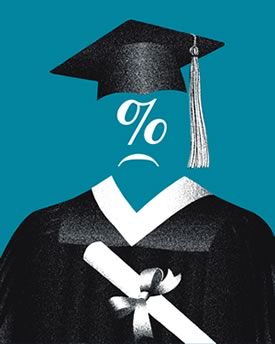A clinical project helps students preyed on by for-profit schools
When it abruptly closed its doors for good last January, the American Career Institute, a for-profit college with five campuses in Massachusetts, left students stranded in dire financial straits: They won’t get the job training or certificates they paid for, but they remain on the hook for student loans they can’t afford.
Stories like this are not unusual. Many for-profit colleges, which get the overwhelming majority of their revenues from federal financial aid programs, rely on high-pressure tactics and false employment and salary guarantees to lure students into taking out loans. Unlike most other debts, student loans are almost never dischargeable in bankruptcy. Yet, within three years of leaving for-profit schools, 25 percent of students have defaulted, significantly more than at other colleges, according to the Massachusetts attorney general’s office, which is investigating ACI.
Now, through the efforts of Toby Merrill ’11, some of the victims of these practices can get free legal aid to enforce their rights. Merrill was awarded a 2012 Skadden Fellowship to expand the services of the Predatory Lending Prevention/Consumer Protection Clinic at HLS’s WilmerHale Legal Services Center, which had huge success in battling the subprime mortgage crisis, into the area of student loans. HLS is the first law school to incorporate such cases into its clinical program.
“We’ve wanted to do this work for years,” says Max Weinstein, a lecturer on law and clinical instructor in the predatory lending clinic. “We were fortunate to have Toby seek us out.”
As a 3L, Merrill was a student of Weinstein’s in the predatory lending clinic, working on a subprime mortgage case, when she learned her client also had student debt she was unable to pay—with few remedies. “Unlike credit card and mortgage debt, and most other sorts of debt, student debt is inescapable,” Merrill says. “It sticks with you until you die.”
Not all student lending is predatory, Merrill is quick to point out. She’s focusing on for-profit colleges that target low-income people—for example, a student who goes to a trade school for a relatively low-paying profession but takes on an enormous amount of debt. “They are really mined for all the federal money they are worth, and then left with debt but no benefits,” she says. It’s an issue everyone should be concerned about, she adds. “This is your money and my money going to private executives making millions of dollars a year on the backs of poor people.”
The practice is just getting on its feet, with Merrill doing outreach to local organizations to let potential clients know of her work. By late March she had done about 35 client intakes, including some from ACI, although not all will result in lawsuits. In addition to several clinical students working with her, a student group is starting to provide opportunities for 1Ls and 2Ls to counsel victims of predatory student loans without enrolling in the clinic. The Legal Services Center, in conjunction with a community partner, recently received a grant to participate in a pilot program on student loan counseling.
Weinstein notes that Massachusetts already has good consumer protection laws, with strong regulation of student loans. The problem is that they have rarely been enforced through litigation, another way in which the student loan situation parallels the mortgage crisis in the commonwealth. “Our clinic [mortgage] cases were, in some instances, the first to result in a published decision enforcing the law,” he says. “It’s my hope that the project on predatory student lending will play a similar role,” he added, “ensuring that student borrowers receive the protection to which Massachusetts law entitles them.
